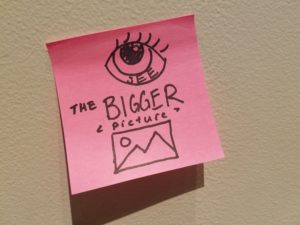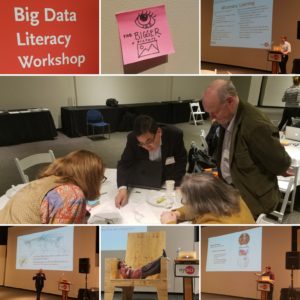
Guest post by Catherine Cramer, NYSCI
Increasingly, the prosperity, innovation and security of individuals and communities depend on a big data-literate society, which calls for a concerted effort to define what it means to be a big data literate citizen, information worker, researcher, or policymaker. As a step toward that goal, the New York Hall of Science (NYSCI) held a Big Data Literacy Workshop, at which over 40 participants worked to identify the quality of regional learning resources and programs that can improve big data literacy, and to chart a path forward that will bridge big data practice with big data learning, education and career readiness. The Workshop brought together experts from the institutions of the Northeast Big Data Innovation Hub (NEBDIH) and elsewhere to study the state of big data literacy across the Northeast and beyond and to make recommendations for its trajectory over the next 5 years.
The Workshop, which took place over April 13-14, 2017 at NYSCI, is part of a larger effort by NYSCI to spearhead the NEBDIH Big Data Literacy effort through an NSF Spokes Planning Grant (CISE IIS award 1636736).
The goals of this planning project are:
- To cultivate and engage big data communities of practice around learning and education;
- To identify and articulate the nature and quality of regional big data learning resources;
- To draft a set of big data literacy essential principles and a planning document featuring strategies to advance lifelong and life-wide big data literacy for grades P-20 across learning settings.

Big Data Literacy Workshop, 4/14/2017
The first step in the Planning process was to create an Inquiry Group (IG) consisting of 15 members of the NEBDIH who had indicated strong interest in providing input to the process of identifying the nature, quality, and use of big data education resources (such as mentoring, tools, materials, programs and curricula) and the capacity for these resources to bridge the gap between basic data skills and big data skills. The IG used a collaborative inquiry process to identify these resources and the capacity for them to bridge the gap between basic data skills and big data skills, draft a framework for a set of priority Big Data Literacy topics, and available resources under each topic in order to identify gaps.
The Workshop brought the IG together with stakeholders from the private sector, as well as government, research and the learning science communities to articulate the requirements of effective big data literacy. The Workshop consisted of small and large group discussion and brainstorming, an iterative process to discover key big data literacy essential concepts, Keynote talks and hands-on activities. Through a process of iteration, draft Big Data Literacy Essential Concepts were developed and refined.
Workshop participants articulated a number of important outcomes from the collaborative effort:
- The ability to view and solve problems collaboratively;
- An acknowledgment of diverse perspectives, approaches, and methodologies;
- Integration of big data literacy education and training initiatives across disciplinary fields;
- Development of a unified framework and sustainable infrastructure that will allow for joint project implementation and oversight;
- Support for a “real-world research opportunity,” where people make data-smart decisions in non-partisan ways;
- Critical thinking and awareness of biases inherent in the news media landscape;
- Ability to bridge sectors and educational opportunity areas; and
- An ability to operationalize the core ideas that the group articulates.
Through the development of the Inquiry Group and attending the workshop, participants gained heightened knowledge and understanding of big data learning resources available throughout the Northeast region, information that they brought back to their communities and can use through their outreach efforts.
In collaboration with project leadership, the evaluator, New Knowledge Organization, Ltd., prepared and delivered a post-workshop survey to the workshop participants. Workshop survey data were analyzed through a Community of Practice (CoP) lens to examine the potential for using the CoP model for a broader, long-term initiative. (A CoP is a way of learning in which a group of individuals in a common enterprise share information and experiences and collaborate to strengthen their skills and knowledge.) Early evidence of interaction related to each of the five CoP cycles was observed during the workshop. While not yet an actual CoP, observations of participants at this early stage were promising and will assist the project team in developing indicators for each stage of the full CoP analysis for the full Spokes project to be proposed in the Fall. It also provides early indicators that suggest a CoP would be a useful framework to develop future collaboration, interpret impacts and be a model to identify indicators and markers for community growth.
Potential collaborators interested in Big Data Literacy Spoke activities should contact Stephen Uzzo and Catherine Cramer at NYSCI.
